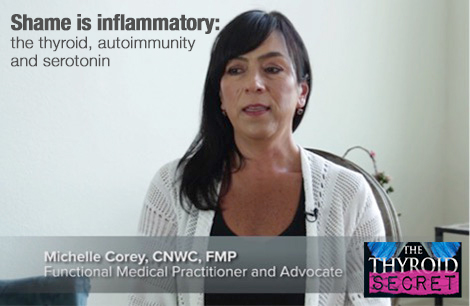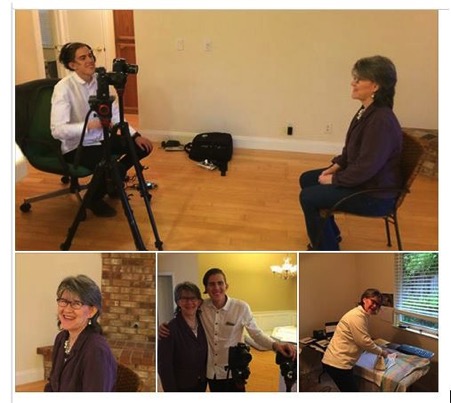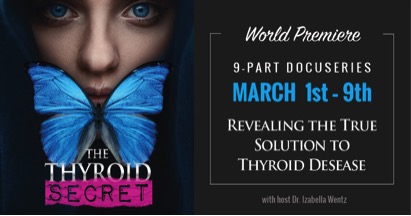
A quick reminder that The Thyroid Secret online documentary replays air this weekend – all 9 episodes will be available to watch! It comes highly recommended! (You can still register here)
In Episode 5, The Stress Sickness, Michelle Corey, Functional Medical Practitioner, Nutritionist and author of the groundbreaking book The Thyroid Cure, The Functional Mind-Body Approach to Reversing Your Autoimmune Condition and Reclaiming Your Health, talks about the connection between shame and inflammation:
We know that shame is inflammatory. In fact, there was a study done where they had students sit for 20 minutes and think about some experience in their life that was shameful. They measured their blood afterwards, and they found spikes in inflammatory cytokines. We know that, from that study that induced shame cause a lot of inflammation. Unfortunately, we live in a global culture of shaming.
…shame is not something people really wanted to talk about, even psychologists or psychotherapists. Because shame is shameful. When you think about something shameful, it’s like the worst thing…
It’s very uncomfortable to speak about. I think just getting into the conversations about it. Just even journaling is one of the ways, because it is inflammatory. I have found, because I work with the autoimmunity [community], and there has been a big connection between abuse and autoimmunity in my practice that there is a lot of shame there. Just having someone be there to truly share your experience in a nonjudgmental way. Not in the way that I’m going to fix you, but just hear your story and have empathy for you. That’s one of the ways that shame dissolves. Because empathy is the antidote to shame. If we can have empathy for ourselves, if others can have empathy for us.”
She is talking about autoimmunity but this topic of shame and empathy is very relevant for my community – that means you of course – simply because of the shame and stigma around anxiety and mental health in general.
In case you’re interested here is the study Michelle is referring to: Immunological effects of induced shame and guilt, published in Psychosomatic Medicine in 2004.
I so appreciate everyone in the series, including Dr. Izabella Wentz, for sharing their powerful stories without shame so we can all be inspired and learn from them and have hope!
It’s not easy. I know because I used to have anxiety and panic attacks myself and made the choice to talk openly about the struggles I had. I was cautioned by a well-meaning mentor not to talk about it. She warned me that it was not professional and just not done in the field. I chose to be open and share anyway and I’m really glad I made this decision. It’s so important for healing on so many levels – for me and especially for those of you who hear my story and have hope!
In this same episode the topic of negative thoughts, the fears that we’re holding and the [negative] beliefs that we have about the body are discussed by Marc David and Emily Joy Rosen, founders of The Institute for the Psychology of Eating.
Marc shares this about these impacts on autoimmunity and the body attacking itself:
Autoimmune disease. That’s an autoimmune disease literally of our thinking, it’s self attacking self. It makes perfect sense to me because we know mind and body track one another. If I’m attacking self with negative thoughts, physiology can often follow where all of a sudden the body starts to attack itself. Or the body can attack its own thyroid gland. Which is, wow, how does that happen?
And Emily talks about how these thoughts impact treatment protocols:
I’m not saying that’s the only factor whatsoever. I think it is really important to look at the [negative] thoughts that we’re thinking. The fears that we’re holding, and the beliefs that we have about the body. Because they will impact the efficacy of any treatment protocol.
I wholeheartedly agree with both Marc and Emily and would like to add that these are all classic signs of low serotonin (that we can easily address):
- negative thoughts (or negative self-talk)
- fears and phobias and
- the [negative] beliefs that we have about the body (often seen as low self-esteem or lack of confidence)
We could even connect the shame Michelle Corey talks about to low serotonin. The definition of ashamed is “reluctant to do or say something through fear of embarrassment or humiliation” or “hesitant or afraid to do or say something.” It sounds like low serotonin doesn’t it?
The wonderful thing is that these signs of low serotonin can be eliminated with some key nutrients.
The quickest and most effective way to boost serotonin is with the amino acids tryptophan and 5-HTP. I discuss the amino acids in the documentary: I touch on them in episode 2 and you hear me go into more detail in the FULL interview (which is part of the Deluxe GOLD package if you’re considering purchasing the series). Other ways include assessing and addressing low zinc, low vitamin B6, a need for inositol or curcumin or saffron, leaky gut and an out of balance microbiome. Eating GMOs, trans fats and gluten is detrimental. Exercising, eating grass-fed red meat and wild fish and supporting the adrenals is beneficial.
I hope you enjoyed this snippet and enjoy the replays!
And a quick reminder: did you know you can own the entire Thyroid Secret documentary series for yourself?
- The Premium Silver Package, includes all 9 video episodes of The Thyroid Secret documentary series, complete easy to read transcriptions and MP3 audio recordings of each episode
- The Deluxe Gold Package includes over 100+ amazing expert video interviews and 64 patient stories in over 76 hours of videos, transcriptions and MP3 audio recordings of each full length interview.
I’d love to hear some of the highlights you found useful and practical? Please share below in the comments.
PS. Feel free to share The Thyroid Secret online documentary with friends and family – all 9 replays air this weekend.


